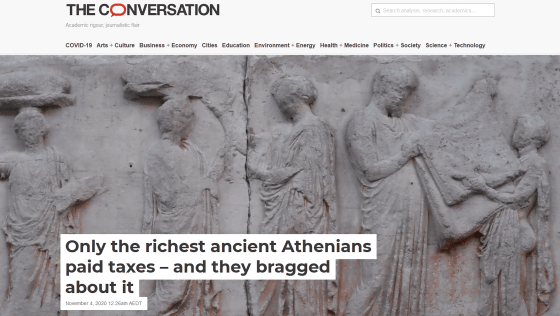'Payment of taxes' was an honor and taxpayers were proud in Athens, ancient Greece

by
Today, many people are reluctant to pay taxes, and there are many cases where wealthy people and large corporations use tax havens to escape taxes. However, in Athens, which prospered as a city-state in ancient Greece, there was a direct tax paid only by very wealthy people, and most taxpayers boasted the amount paid as tax, Professor Thomas Martin of the College of the Holy Cross said. I am explaining.
Only the richest ancient Athenians paid taxes – and they bragged about it
https://theconversation.com/only-the-richest-ancient-athenians-paid-taxes-and-they-bragged-about-it-147249

Athens in the 4th and 5th centuries BC was home to more than 300,000 people, including free citizens and slaves, and was prosperous through international trade. In Athens, in order to maintain the city-state, it was necessary to support defense organizations and set up fountains for drinking.
The funds used to run the city are the income of public farmland and silver mines lent to businesses, taxation on imports and exports of traded goods, monetary collection from immigrants and prostitutes, and fines imposed on losers of lawsuits. It was covered. On the other hand, in general, no direct tax on income and wealth was introduced.
As Athens grew significantly, the Navy also strengthened, with hundreds of

by
In ancient Greece, including Athens, there was a public service system called Reiturgia , and the top 1% of the wealthy people spent their private money on special public works projects to support them.
Funds for the construction and equipment of the trireme have also been provided by Reitrugia, and the nominated wealthy will become the commander of the trireme, bearing the operating costs for one year and making the crew a mission. I guided. Of course, the operating cost of the trireme was not cheap, but most of the wealthy people accepted this obligation.
The wealthy are responsible for various aspects of national defense, not just triremes, and during the Athenian war, the wealthy gave soldiers a fund called 'eisphorai.' Professor Martin points out that in a sense it acted as a direct tax on the wealthy, as it was decided based on each person's property whether or not to bear these obligations.
The Athenians not only strengthened their direct military power to protect the city, but also built elaborate temples and held big festivals to gain 'the favor of the gods.' The funds of the wealthy are also used for these projects, and the wealthy who served as the 'leader' in the chorus of theatrical performances at the festival are said to have paid for the performer's training, costumes, and living expenses.

It is estimated that $ 1 (about 105 yen) is
The wealthy people in Athens were proud to pay taxes and publicly boasted that they 'paid more than necessary for triremes and choirs.' Of course, some people tried to escape the payment by insisting that 'the person who has more property than himself should bear the tax', but it was not the majority who tried to escape the tax. ..
Regarding why the wealthy people took pride in paying taxes, Professor Martin said, 'We hoped that the wealthy people would get public respect and high profits from the investment in the community that tax payments show.' Stated. The Athenian citizens highly valued the contribution of tax payments, so it seems that the social capital built by the fact that they 'paid a lot of taxes' was valuable. On the other hand, those who tried to escape tax payment were ridiculed and labeled as greedy.
The social rewards earned by the wealthy by paying taxes seemed to be quite long-lasting, and the wealthy who funded the choir that won the contest praised their achievements and built a monument prominently. At the time of writing the article, a monument called the Lysicrates monument still exists.

by Andrew Barclay
Professor Martin argued that the wealthy people in Athens were recognized as 'useful and good citizens' and actively paid taxes in hopes of social success. 'Being seen by the public as a good and useful wealthy taxpayer was more important than bank money. The irreplaceable public services thus provided have maintained democracy for centuries. It has benefited all Athenians, 'said Professor Martin.
Related Posts:
in Note, Posted by log1h_ik







